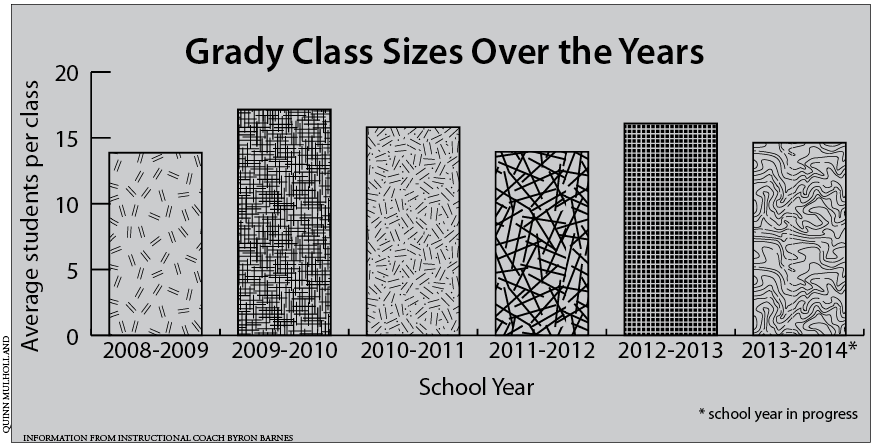 When journalism and speech and debate teacher Mario Herrera arrived to Grady on Aug. 7 for the first day of school, he expected the usual array of huge classes that he had gotten in years past. Instead, he was pleasantly surprised.
When journalism and speech and debate teacher Mario Herrera arrived to Grady on Aug. 7 for the first day of school, he expected the usual array of huge classes that he had gotten in years past. Instead, he was pleasantly surprised.
“This year has been smooth-starting overall,” he said. “Copiers and buses have always been an issue, but it’s been really seamless.”
That’s because over the summer, Grady hired 16 new teachers, 12 to replace those that left after last school year, and four to provide extra help in certain areas in which the district and state as a whole struggled last year.
“We tried to maximize areas where we could use improvements,” literature teacher Susie Mercer said.
The APS Board of Education, which decided over the summer to allocate funds to hire 40 new teachers, paid for the new teacher positions. The expenditure kept student-teacher ratios about the same as last year. APS class sizes already exceeded class-size limits mandated by the state, and only a state board waiver allowed APS to keep class sizes at their current levels. The express purpose of hiring the new teachers was to effect academic improvement in specific areas, not to reduce class sizes overall.
Mercer said that for high schools, coordinate algebra is one of the subjects where the new teachers are going to help.
“In Georgia, the algebra [End of Course Test] scores went down a lot last year across the whole state because the test was changed,” Mercer said. “So we would like to keep our algebra classes, for example, a little bit smaller than say, Math III, where we’re kind of doing fine.”
Grady Principal Vincent Murray said teachers were hired “not just to decrease class size, which is important for the core [classes], but also because of the fact that the academies now go to the 12th grade.”
With the magnet program gone, Murray said, Grady was in need of additional teachers to make sure students can take the courses that their small learning communities require.
Murray said another reason for the new teachers was that Grady has a Moderate Intellectual Disability unit of special-education students this year, which had been dispersed around other APS schools in previous years.
Normally, Mercer said, Grady would undergo a census in October called the Full Time Equivalent, or FTE, in order to determine how many students are enrolled full time. After that count is done, Grady would go through a leveling process, which Mercer oversees, where students are transferred out of large classes and into small classes.
Since Grady wasn’t expecting the multitude of new teachers that were hired this year, however, class sizes were thrown off; some classes were too large and others too small. Therefore, Grady had to go through leveling at the beginning of the school year, in addition to after the October FTE.
“Normally we know before school ends or early in the summer who we’re gonna hire,” Mercer said. “Some of these teachers were hired sort of late, later than normal.”
The process is taking longer than expected, Mercer said, because of the difficulty of changing schedules when many students are taking AP classes or other classes that are only offered at certain times.
Literature teacher Lawrence McCurdy thinks lowering class sizes is important, but that classroom space is more important.
“If you’ve got enough space for the students, then obviously you can have more students,” McCurdy said. “Case in point: college classes can be up to 150 students, and those classes remain effective.”
Freshman coordinate algebra teacher Carrie Rowe also cited space as a point of concern. Rowe is a floating teacher, meaning she moves from room to room throughout the day. Rowe thinks that not having her own classroom negatively affects her teaching.
“Some of the classes I float into are in groups, and my ninth-graders can’t handle groups, some of them, and I really want them in rows, and I’m not gonna change the whole room, because it’s not my room, so that causes kind of a problem,” Rowe said. “I can’t set up the room how I want to.”
Nonetheless, Murray said, there’s not much Grady can do in the way of making new, permanent space for the “floaters.”
“When we do interviews, we do let prospective teachers know that we’re landlocked, for one thing, which means that, in terms of us expanding, there is very little land for us to build on,” Murray said.
Since there is another period of leveling after the FTE count in October, Grady could still gain or lose teachers, depending on how many students are enrolled. Currently, Grady is about 30 students under its enrollment projection, but enrollment is rising every day.
“It’s great this year and hopefully it’ll stay great,” Mercer said, “but if FTE comes in October, and the state decides that we have too many [teacher] bodies, which is different from the district deciding or the school deciding, then they could very well reduce us to back to what we were before, which would then increase class size.”
However it turns out, Herrera has hope.
“So far, from what I see, it’s working,” Herrera said.







